Ruby Barnes's Blog, page 13
September 25, 2012
Pricing strategies for eBooks? Like a flag in the wind!
If there's one thing that does my head in about being an independent eBook author it's pricing strategy. It makes me feel like this:
[image error] The ePublishing demon barks in my ear. Down, demon, down.
So, time to vent. When I started out as an indie in March 2011 with the launch of Peril, I went for 99 cents / 77 pence, the minimum. My focus was on gaining readership. The book slowly gained a bit of exposure, sales were modest and positive reviews started to come in.
I went through early crises of confidence with the title, the book cover and the blurb, all of which didn't help the book's initial impact.

Then, in the autumn of 2011, I had an epiphany (unlike John Baptist, my epiphany didn't involve multiple murder by drowning) - I'm lucky, I have a day job, I don't need eBook revenue to eat.
Whether it was an altruistic move or just a tactic to gain readership (and a dumb one with only one title published) I figured people didn't have to pay for my 90,000 words. So I decided to go free and, via Smashwords, B&N and Kobo, forced a zero price on Amazon in November 2011. That resulted in 16,000 downloads, reaching #12 in the Amazon.com top 100 free titles and producing some follow-on sales (all this happened before KDP Select existed).
In January 2012 I had another free phase with Peril, this time by accident when they forced a zero price match to a New Year giveaway I had on my blog. That resulted in a few hundred more giveaways before the Zon put it back to priced. Things then stabilised. Enough giving away my stuff for nothing. I had two titles out (with the launch of The Baptist) and decided on a $2.99 / £1.79 pricing strategy. Sales increased incrementally from month to month. I added The New Author in March 2012 and The Crucible in July 2012, both priced the same. All four books were also released as paperbacks. With four titles on multiple sites in eBook and paperback I saw a steady growth and put my shoulder to the wheel in writing further new releases.
The other day I read Dean Wesley Smith's blog post The New World of Publishing: 2013 and thought Yeah, that's right. He thinks his novels are worth $7.99. I think mine are worth money too. Maybe I'll increase them above $2.99. It kinda made sense because Peril and The Baptist have great reviews on Goodreads and Amazon, and The Crucible is picking them up now too.
All the while, though, that little demon was barking on my shoulder. People will buy more of your books if you price them higher? What colour of crazy is that, Mr Nobody Barnes? I personally, as a reader, baulk at paying more than a couple of bucks, quid or whatever for an eBook. They just don't have the fixed costs of a print book.
Then yesterday I saw D.D. Scott post this: Ebook Pricing The D. D. Scott Way: Do I Still Want to be The SnickersBar of Ebooks? U Betchya! D.D. made a lot of sense. DWS had appealed to my ego and D.D. was talking to my common sense. What's the point of being $7.99 and proud if only a handful of people buy the book? I thought about DWS and what he has that I don't - more than 100 popular novels and a very nice hat. That equates to one huge fan base, the self-esteem to wear that hat and a guaranteed volume sales of new releases. D.D. has a good number of books out (she aims for 20 titles by end 2012) but has built volume at unashamedly low prices using great content and successful promotion (box sets, first in series for free etc). She's achieved volume and revenue, and maintained self-esteem, without a hat.
Blimey! What to do, what to do? Which way is the wind blowing? I've recently cut the day-job down to 4 days so I can produce more writing and release more titles. At some point I have to stop pretending I'm running a charity and start to balance sales volume with price.
I decided to put two of my four titles down to 99c / 75p (The Crucible Part 1 and The New Author) for a month or more and compare how things go with my established titles at 2.99 (Peril and The Baptist).
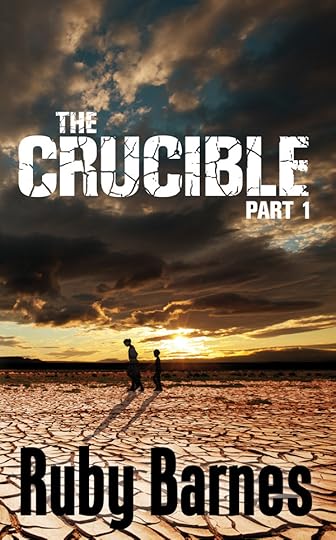
I made the change yesterday p.m. and a couple of sales registered pretty immediately on those 99c titles. By the time I was ready to turn in last night, I had 10 extra on one title and 4 loans (yeah, one title is in KDP Select). When I woke up this morning I put off checking the reports until I’d had my shower. This would be the breakthrough. I was already wording my blog post in my head and D.D. would feature big time. When I was all spruced up and dressed for the day job I let myself check the laptop. Guess what? It was all a £^%&%^ dream! There were a couple of extra sales on those 99 centers but no loans, definitely dreamt it.
Gonna stick with that plan though (until the wind changes).
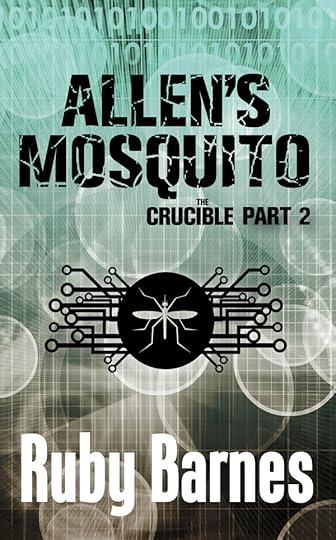 coming soon...
coming soon...

[image error] The ePublishing demon barks in my ear. Down, demon, down.
So, time to vent. When I started out as an indie in March 2011 with the launch of Peril, I went for 99 cents / 77 pence, the minimum. My focus was on gaining readership. The book slowly gained a bit of exposure, sales were modest and positive reviews started to come in.
I went through early crises of confidence with the title, the book cover and the blurb, all of which didn't help the book's initial impact.

Then, in the autumn of 2011, I had an epiphany (unlike John Baptist, my epiphany didn't involve multiple murder by drowning) - I'm lucky, I have a day job, I don't need eBook revenue to eat.
Whether it was an altruistic move or just a tactic to gain readership (and a dumb one with only one title published) I figured people didn't have to pay for my 90,000 words. So I decided to go free and, via Smashwords, B&N and Kobo, forced a zero price on Amazon in November 2011. That resulted in 16,000 downloads, reaching #12 in the Amazon.com top 100 free titles and producing some follow-on sales (all this happened before KDP Select existed).
In January 2012 I had another free phase with Peril, this time by accident when they forced a zero price match to a New Year giveaway I had on my blog. That resulted in a few hundred more giveaways before the Zon put it back to priced. Things then stabilised. Enough giving away my stuff for nothing. I had two titles out (with the launch of The Baptist) and decided on a $2.99 / £1.79 pricing strategy. Sales increased incrementally from month to month. I added The New Author in March 2012 and The Crucible in July 2012, both priced the same. All four books were also released as paperbacks. With four titles on multiple sites in eBook and paperback I saw a steady growth and put my shoulder to the wheel in writing further new releases.
The other day I read Dean Wesley Smith's blog post The New World of Publishing: 2013 and thought Yeah, that's right. He thinks his novels are worth $7.99. I think mine are worth money too. Maybe I'll increase them above $2.99. It kinda made sense because Peril and The Baptist have great reviews on Goodreads and Amazon, and The Crucible is picking them up now too.
All the while, though, that little demon was barking on my shoulder. People will buy more of your books if you price them higher? What colour of crazy is that, Mr Nobody Barnes? I personally, as a reader, baulk at paying more than a couple of bucks, quid or whatever for an eBook. They just don't have the fixed costs of a print book.
Then yesterday I saw D.D. Scott post this: Ebook Pricing The D. D. Scott Way: Do I Still Want to be The SnickersBar of Ebooks? U Betchya! D.D. made a lot of sense. DWS had appealed to my ego and D.D. was talking to my common sense. What's the point of being $7.99 and proud if only a handful of people buy the book? I thought about DWS and what he has that I don't - more than 100 popular novels and a very nice hat. That equates to one huge fan base, the self-esteem to wear that hat and a guaranteed volume sales of new releases. D.D. has a good number of books out (she aims for 20 titles by end 2012) but has built volume at unashamedly low prices using great content and successful promotion (box sets, first in series for free etc). She's achieved volume and revenue, and maintained self-esteem, without a hat.
Blimey! What to do, what to do? Which way is the wind blowing? I've recently cut the day-job down to 4 days so I can produce more writing and release more titles. At some point I have to stop pretending I'm running a charity and start to balance sales volume with price.
I decided to put two of my four titles down to 99c / 75p (The Crucible Part 1 and The New Author) for a month or more and compare how things go with my established titles at 2.99 (Peril and The Baptist).

I made the change yesterday p.m. and a couple of sales registered pretty immediately on those 99c titles. By the time I was ready to turn in last night, I had 10 extra on one title and 4 loans (yeah, one title is in KDP Select). When I woke up this morning I put off checking the reports until I’d had my shower. This would be the breakthrough. I was already wording my blog post in my head and D.D. would feature big time. When I was all spruced up and dressed for the day job I let myself check the laptop. Guess what? It was all a £^%&%^ dream! There were a couple of extra sales on those 99 centers but no loans, definitely dreamt it.
Gonna stick with that plan though (until the wind changes).
 coming soon...
coming soon...
Published on September 25, 2012 07:55
September 21, 2012
Fifty Shades of Grey? A load of old rope … knot.
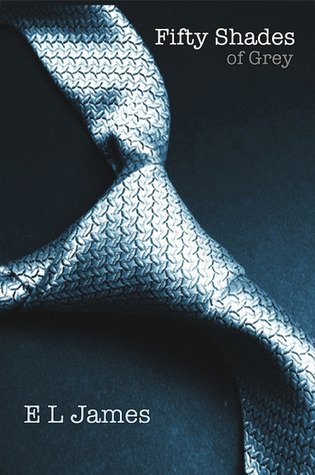 I must be almost the last person on the planet to read Fifty Shades of Grey. EL James has become the latest big-selling author to be maligned by readers and authors alike, as much for her writing style as for the content, so I thought I'd take a look. Well, okay, my wife got hold of a copy and I started to sneak off with it into dark corners. Here's what I found (warning - contains mild spoilers, double entendres and spanking of writers, readers and most everyone).
I must be almost the last person on the planet to read Fifty Shades of Grey. EL James has become the latest big-selling author to be maligned by readers and authors alike, as much for her writing style as for the content, so I thought I'd take a look. Well, okay, my wife got hold of a copy and I started to sneak off with it into dark corners. Here's what I found (warning - contains mild spoilers, double entendres and spanking of writers, readers and most everyone).The most immediately noticeable thing about Fifty Shades is the first person, present tense narration. This was originally written as Twilight fan fiction, a series that uses the same intimate and claustrophobic narrative style. I'm no stranger to first person (my own first two indie novels use that style) and well aware of its limitations. A lot of readers immediately walk away from first person and those who don't like the style but persevere in hopes of BDSM mommy porn are already hard to please.
With first person narrative the reader is obliged to stay within the narrator's mind and only gets their take on things. Timelines tend to be linear, every day accounted for with a strong sense of chronology that risks becoming mundane. The first person narrator will observe, think and talk in a consistent style with a vocabulary that might feel repetitive to the reader. Think about it; we tend to use the same spoken words and thoughts on a day to day basis. Anastasia is a young thing, innocent, educated, intelligent, low in self-esteem but not isolated from the modern world. Her account of events is going to be from her perspective: naive, humorous, inquisitive, infatuated, insecure, unrequited, confused and, at times, clichéd. Despite her strong education and literary interests, she isn't going to have the life knowledge and hindsight that will enable her to eloquently describe her observations, experiences, physical feelings and emotions. Having accepted that, the FSOG story can be examined further.
The paperback copy that came into my hands was well-fingered. It had sweated in the hands of numerous ladies as they took lengthy baths to ensure a private reading away from interfering hubbies. When I had the chance to claim it for my own it was already past its prime, all floppy and wrinkled. The first few pages slipped from the spine onto the floor with a sigh. I held the remainder and tried to picture all those readers. Would the book be an anti-climax? Or had they all reached the self-gratification they had been searching for? (Compare the FSOG mommy porn content with my poor efforts and you'll see it ain't easy to avoid slipping into slapstick innuendo and double entendre!)
It was hard going. (Okay, I'll stop with that now.) The first fifty or so pages were all chick lit romance and I thought I'd made a mistake in trying FSOG. Then I remembered the first words from my wife as she had reached the first raunchy bits - "She has no gag reflex!" What could she possibly mean? I persevered. Things started to get weird. Non-disclosure agreements and contracts. Vanilla sex occurred, with a cherry on top. Things were looking bad for Anastasia in her innocence. I couldn't imagine all the previous readers of this copy (probably the entire female population of holy Catholic Ireland) had read a novel containing stuff normally only found in the red light district and live sex shows of Amsterdam.
Well, it didn't go there. It went somewhere else, far more disturbing.
Most of us are not natural leaders. We spend a lot of our work and personal lives looking for people to tell us what to do. In the majority, I think we're submissive by nature. The minority are dominant. When someone in authority directs us we, in the majority, tend to comply. That's how society works.
Take the concept into a personal relationship. If that dominant person is physically attractive, and there's an irresistible chemistry, it can lead to a relationship that appears unfair from the outside but satisfies the couple's private needs. That's what happens in FSOG. Anastasia is surprised by her own participation but justifies it with the rationale that she's really trying to convert Christian to normality. That's one hook to keep the reader going - the hope that Mr Gorgeous Perv will convert to a romantic. The other hook is a promise of hard core misbehaviour, as specified in the dreaded BDSM contract.
I did enjoy the touches of wry humour and the use of Anastasia's foxy inner goddess and insecure subconscious to explain her thought processes. Unrequited love and lust has always been a favourite topic for me. Anastasia wants Christian Control Freak to behave in a more predictable fashion and there's some irony in that. She's willing to endure physical and emotional debasement in an attempt to bring his behaviour and moods into a spectrum she can cope with. At the end of the day the subtle flaws in her character outweigh his overt perversity, as she is ultimately bent on relationship self-destruction and predictably sabotages the stairway to romance heaven every time it presents itself.
The ending leaves a void as Anastasia pricks her own balloon. Annoying, yes. A set up for the next book in the series, yes. EL James maintains the titillation and keeps her readers on the cusp of release. Yes.
Ruby Barnes is the author of The New Author, The Crucible, The Baptist and Peril
Published on September 21, 2012 01:55
September 20, 2012
Is twitter driving you demented?

I have a guest post today over on Sweet Louise Wise's blog.
It describes how Feed140 and Triberr can help you regain your sanity in the world of blogging and twitter.
Please go on over and have a gander / butcher's ;-)
http://www.louisewise.com/2012/09/is-twitter-driving-you-demented.html#.UFrwx67neSq

Published on September 20, 2012 03:40
September 14, 2012
So, you've written a novel? Hurray! Go edit.

Completion of a novel is a great satisfaction in itself. Celebrate that achievement and then put the book aside for a period of time, from a couple of weeks to a couple of months if you can stand it. Start another project, keep writing, but let your completed manuscript be for a while. When you come back to it, you do so as a reader instead of author and you'll have a much more objective take on what works and what doesn't.
So, putting on your editor's hat, what should you be looking for? Self-Editing for Fiction Writers by Renni Browne and Dave King is a very useful book that contains detailed guidance including checklists, exercises and techniques for editing your novel into shape. The chapter headings of the book (e.g. Show and Tell, Characterization and Exposition, Point of View) reveal editing for what it really is. Editing is the process of realigning your novel with best practice. You read your work through, compare it with The Rules and then adjust as best you can.
How you accomplish this task depends upon what works for you. Here are some characteristic approaches.

The Reiterator likes to edit on the hoof whilst writing the manuscript. S/he writes a paragraph, reads back the paragraph, adjusts, rereads, tweaks. Once the manuscript first draft is finished, The Reiterator may feel that the job is complete. Nevertheless, a holistic view is needed in editing that first draft to ensure the perfect pieces of the jigsaw meld well together. A disadvantage of The Reiterator is completion of the first draft can take a very, very long time compared to other approaches which are more tolerant of imperfection.

The Salami Slicer takes a knife to the manuscript and severs slices of less than perfect writing according to each of The Rules. The Salami Slicerplaces the narrative voice hat upon their head and reads the manuscript through for consistent and appropriate narrative point of view, adjusting as necessary. Then the dialogue hat is donned, the show-not-tell hat and so on. This approach means a new read through for every rule but is very thorough. One pitfall is The Salami Slicer can become fixated on a particular aspect of The Rules and overdo the editing. For example, the word that is often overused by new authors and can be eliminated unless essential for the meaning of a sentence, but such a narrow focus can lead to a mechanical approach and leave readers tripping over sentences where that is actually needed but has been cut.

The Jack of All Trades applies all the rules at once as s/he reads through the manuscript, spotting discontinuities, point of view slips, structural and grammatical problems etc. as they arise. This is the fastest and most holistic way to edit but requires a high degree of alertness and flexibility. If you can do this then perhaps you have a future career sideline as an editor!

The Listener prefers to hear the manuscript read aloud. A traditional Listener will lock themselves away and read the book out loud to themselves, but the 21st century Listener uses a text-to-speech facility on their e-reading device or laptop. There are numerous text-to-speech voices and accents available free on the web, but even the robotic default MS voices do a good job of exposing missing commas, word echo, unintentional alliteration and stilted or unnatural dialogue. A good Listenercan sense, from the cadence of spoken word, the mood and emotions of the piece. That's if they can concentrate and stay awake for the duration of the reading.

The Outsourcer wants to be done with the manuscript once the first draft is completed and have a third party (sometimes more than one) take care of slapping the novel into shape. Depending upon the level of financial investment you are willing to make, this may be an option. Some novel writing books advocate passing your manuscript through the hands of different types of editor e.g. developmental, copy, proofreading. The advantage of this is you can whisk your manuscript off to the third party as soon as it's finished, no time wasted. The disadvantage is the author doesn't gain the learning themselves from having self-edited. In addition, editors can't make a silk purse out of a sow's ear. If, as an independent author, you do want to outsource your editing then you need an element of confidence that your writing has reached a level that makes paid-for editing worthwhile.
Self-editing is a learning experience. Being able to spot what works and what doesn't, and learning how to fix the deficiencies, eventually leads to an increased sophistication in the author's writing. These skills can be further developed by participating in writing groups where you will also have the opportunity to edit the work of others.
The above is an extract from The New Author - a self-help guide to novel writing, publishing as an independent ebook author and promoting your brand using social networks
Published on September 14, 2012 16:22
September 12, 2012
Silver bullet or viral snake oil?

What's this blog post about? Vampires? A zombie virus? No, something far less interesting to readers, but more interesting to authors. The secrets of book marketing.
Every once in a while there's a huge kerfuffle in the indie author community. Sometimes it's plain old envy wrapped up in attempted literary criticism. Remember when J.K. Rowling was the bane of everybody's life because she was so successful but a lot of folks thought her prose to be less than Nobel Prize for Literature standard? How about the disdain poured by writers on Stephanie Myer's Twilight series? More recently the crown of scorn has passed on to E.L. James for Fifty Shades.
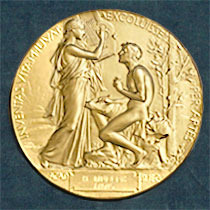
Nobel Prize Medal for LiteratureThe medal of the Swedish Academy represents a young man sitting under a laurel tree who, enchanted, listens to and writes down the song of the Muse.
What's the common thread here? Where's the silver bullet, the marketing secret (probably an underhand technique as we all write somuch better than these household names, don'twe)? Wizards, horny vampires and mommy porn? Well, people want it. In large portions, apparently. Did they know what they wanted before it was laid out before them in all its Quidditch playing, fang bearing, grey eyed bondage glory? A latent demand for being somehow spellbound. Clever marketing by people who know about clever marketing.
Wait a minute, traditional marketing doesn't work for ebooks! (according to various bods who are quite convincing). John Locke, he of recent purchased review infamy, spent a substantial sum of money on traditional marketing without success.
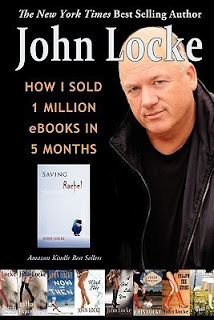 Whether you think his 'How I Sold 1 Million eBooks in 5 Months' was a rip-off or not, he does make some interesting points. Locke's attempts to buy sales through traditional marketing methods were quite ineffective (although those bought reviews did include downloads that boosted his rankings). I don't think he really knows for sure what his watershed moment was, but Locke suggests the catalyst was when one of his blog posts went viral. The blog went crazy, sales took off, he built a mailing list of loyal followers and every subsequent new release had an eager audience.
Whether you think his 'How I Sold 1 Million eBooks in 5 Months' was a rip-off or not, he does make some interesting points. Locke's attempts to buy sales through traditional marketing methods were quite ineffective (although those bought reviews did include downloads that boosted his rankings). I don't think he really knows for sure what his watershed moment was, but Locke suggests the catalyst was when one of his blog posts went viral. The blog went crazy, sales took off, he built a mailing list of loyal followers and every subsequent new release had an eager audience.Viral is the key. Word of mouth recommendation (word of Google?) is thought to drive e-book sales. Hey, word of mouth drives all book sales, doesn't it? When readers recommend your book and when they're looking out for your next release you have it cracked!
Like many other indie e-book authors I spend an unjustifiable amount of my time looking for the silver bullet. Countless people in groups on facebook, Goodreads and all kinds of other places are doing the same thing. Sometimes confident folk profess to know the answer.
Tag your book. Get everyone in all your groups to tag your book. Now you're in the top ten search for your tag on dot com. Does it help sales? Look at the rankings of the other top tag search books. No, it doesn't. But it can't do any harm, can it? Best take some of that snake oil.
Like your book. Get more than forty likes on your book and something wonderful will happen. You'll get a new puppy or a kitten, maybe. Loads of book sales? No. But it can't do any harm, can it?

Blog tours, author interviews, guest posts, twitter teams. They can be effective in driving up your blog traffic, that's for sure. Is there a direct correlation between blog hits and sales? No, not necessarily. I'm in a twitter team with a lady who had 5,000 blog page views last month and sold 5 books (hmm, same number 5, sounds appealing like a correlation but, if so, it's a titchy one). Another guy had a quarter of a million page views in the last few months and sales remain modest. (He's also tried every form of e-book advertising known to indie, mostly with uneconomical returns.)
Free can do it. KDP select or Smashwords. Give your baby away for nothing to those readers who scoop free books into their Kindles like panic buyers loading shopping trolleys on the eve of Armageddon. If you get coverage on the most popular free book sites you might get a glorious few seconds basking in dot com limelight (my first novel Peril was #12 in the Zon top 100 last winter for a day or two). There will be a few days when you think you've made it, until the air starts to leak out of the balloon. If you have a series of books it can help, but standalone titles get a post-free lift and then tend to fade, back down to #100,000+ rankings within a few weeks. Then a few stinging reviews from those panic buyers start to trickle in, readers who were never really your target market.
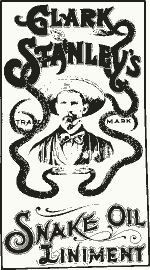 How about studying the big hitters and copying them? After all, imitation is the sincerest form of flattery. I've followed big-selling indie authors, peeking around corners on the virtual streets of our global author village, reaching out to try and fondle their coat tails and be touched by greatness. KDP Community and other forums can be interesting places to pick up the trail of the silver bullet. Successful indies sometimes share their sales figures, prompting awestruck gasps from some and monstrous envy from others. Fragments of truth slither around in snake oil as the indies scramble to pan-handle for those golden nuggets of success. The same old stuff gets thrown up - tagging, liking, review each other, buy each other, start a recommendation website. Fool's gold, mostly. (Hint: before you go charging off on a time consuming marketing escapade check the credentials of the person who suggested the endeavour.)
How about studying the big hitters and copying them? After all, imitation is the sincerest form of flattery. I've followed big-selling indie authors, peeking around corners on the virtual streets of our global author village, reaching out to try and fondle their coat tails and be touched by greatness. KDP Community and other forums can be interesting places to pick up the trail of the silver bullet. Successful indies sometimes share their sales figures, prompting awestruck gasps from some and monstrous envy from others. Fragments of truth slither around in snake oil as the indies scramble to pan-handle for those golden nuggets of success. The same old stuff gets thrown up - tagging, liking, review each other, buy each other, start a recommendation website. Fool's gold, mostly. (Hint: before you go charging off on a time consuming marketing escapade check the credentials of the person who suggested the endeavour.)So what's the answer to enduring sales success? Seriously, now. Except for one hit wonders (and there have been a few that went viral), the answer is grindingly predictable: the author needs a virtual bookshelf of published titles, ideally in one or more series; professional looking covers, brand identity and recognisable as a series; great book blurbs that hook the reader; a clear and popular target genre; clean, well formatted e-book copy. Oh, and don't forget the book itself - writing that makes people want to read more by the same author. It doesn't have to be Nobel Prize winning, it has to be what your target audience wants.
Let's just check the credentials of the author of this blog post. Is Ruby Barnes a big seller? No, (although I've been know to give away a few!) Does Ruby have multiple titles published? Well, four isn't bad. I'm working on it. Are they in a series? Give me a break! Like I said, I'm working on it. Nice covers? I think so. Great blurbs?Working on it. Clear and popular genre?Yes, quirky psycho political Irish noir crime DIY pickled egg (that well known genre). Clean copy? You bet. Is the writing okay? Nine out of ten cats prefer it.
Maybe I should brew up a fresh batch of viral snake oil.
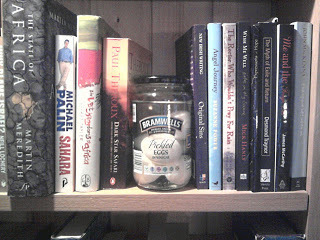
Ruby Barnes is the author of The New Author, The Crucible, The Baptist and Peril
Published on September 12, 2012 08:08
September 7, 2012
If you like literary fiction this is a must read!
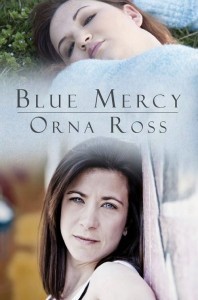 Pick a colour (my favourite is blue). Pick a fabric (okay, silk). Sprinkle it with your favourite fragrance (mine is Light Blue by D&G, no kidding!) Draw the material to you, inhale, clutch it to your face and neck. How does it make you feel? Good, isn't it? That's how I felt while reading Blue Mercy by Orna Ross.
Pick a colour (my favourite is blue). Pick a fabric (okay, silk). Sprinkle it with your favourite fragrance (mine is Light Blue by D&G, no kidding!) Draw the material to you, inhale, clutch it to your face and neck. How does it make you feel? Good, isn't it? That's how I felt while reading Blue Mercy by Orna Ross.I somehow ended up with this book on my kindle, one of a number I'd loaded up for the summer break. Within a few pages I was hooked. The story starts with heavy baggage. Three generations of a family have reached the end of the road and the book is all about unfolding the events that have lead there. The main vehicle for this is the Blue Mercy Manuscript, a memoir left to the daughter when her mother dies. I'm not going to try and summarise the events of Blue Mercy. Calamitous occurrences, major life choice mistakes, dark secrets and tragic bad luck, it all happens to Mercy and her daughter Star. The mother has the benefit of hindsight as she revisits her journey from rebellious teenager to flower child, single mom and quite suddenly an old and ailing woman. She acknowledges her own weaknesses and strengths, conveys the despair of trying to raise a daughter with serious behavioural problems and carries her beauty wherever she goes, like a deadly weapon over which she has limited control.
The contrast between Mercy and Star is acute. They're physically very different and that's important to the story. Star's bulk casts a shadow throughout and her self-loathing is palpable. Mercy is gorgeous but she hates herself for being weak willed. The two women are at irreconcilable loggerheads, putting up a united front only when three men enter their lives at different times, each leading to a different kind of disaster.
There's a twist in the tale. In fact, there are two twists. If you see them coming you're more perceptive than I was. Cruel fate indeed.
Blue Mercy is wonderfully written. Orna Ross, it turns out, is a mainstream published author turned indie. I wish, can only hope, that one day I'll be able to write like her.
There's a moral in the story of Blue Mercy. Life is not a rehearsal, this is it. You have one life, live it.
Published on September 07, 2012 13:31
August 31, 2012
Pick a card, any card

Pick any card and I bet I can tell you what it is. Is it The Crucible?
Okay, so I don't have a Nook (yet) but I do have a Kindle, a Kobo, an iPhone and a very clean proof copy of The Crucible in paperback and that means the paperback release date is being brought forward by one month. The knock-on effect of that is the Goodreads giveaway of 2 paper copies of the book is also being brought forward by a month to 10th September 2012. So, if you want to enter the draw for a free paperback copy of The Crucible Part 1 (some great reviews starting to come in already) then clickety click below!
.goodreadsGiveawayWidget { color: #555; font-family: georgia, serif; font-weight: normal; text-align: left; font-size: 14px; font-style: normal; background: white; } .goodreadsGiveawayWidget img { padding: 0 !important; margin: 0 !important; } .goodreadsGiveawayWidget a { padding: 0 !important; margin: 0; color: #660; text-decoration: none; } .goodreadsGiveawayWidget a:visted { color: #660; text-decoration: none; } .goodreadsGiveawayWidget a:hover { color: #660; text-decoration: underline !important; } .goodreadsGiveawayWidget p { margin: 0 0 .5em !important; padding: 0; } .goodreadsGiveawayWidgetEnterLink { display: block; width: 150px; margin: 10px auto 0 !important; padding: 0px 5px !important; text-align: center; line-height: 1.8em; color: #222; font-size: 14px; font-weight: bold; border: 1px solid #6A6454; -moz-border-radius: 5px; -webkit-border-radius: 5px; font-family:arial,verdana,helvetica,sans-serif; background-image:url(http://www.goodreads.com/images/layou... background-repeat: repeat-x; background-color:#BBB596; outline: 0; white-space: nowrap; } .goodreadsGiveawayWidgetEnterLink:hover { background-image:url(http://www.goodreads.com/images/layou... color: black; text-decoration: none; cursor: pointer; }
Goodreads Book Giveaway
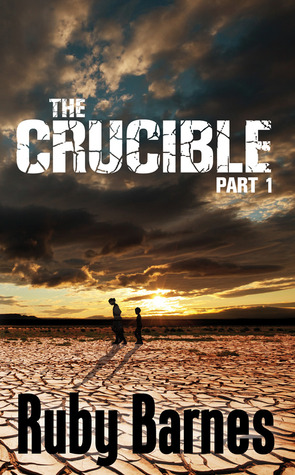 The Crucible by Ruby Barnes Giveaway ends September 10, 2012.
The Crucible by Ruby Barnes Giveaway ends September 10, 2012. See the giveaway details at Goodreads. Enter to win
Published on August 31, 2012 09:16
August 28, 2012
Stepping away from the watched pot
 Cold turkey. No, not Christmas or Thanksgiving leftovers but the only solution to compulsive communication syndrome.
Cold turkey. No, not Christmas or Thanksgiving leftovers but the only solution to compulsive communication syndrome.I thought I had it beaten. 18 months after the launch of Peril as an ebook and with three further titles subsequently released, my social media platform had become increasingly demanding. A couple of neat tools (Triberr and Feed140) had helped me semi-automate promotion via twitter and blog. It gave me a lot more time to concentrate on writing. But I couldn't help continuously watching the pot, looking for incremental changes, following sales figures, interacting on Twitter and facebook, and surveying the virtual world for new reviews of my books. It's a common problem, this compulsion to keep your finger on the pulse of a complex system. You can read about it on any number of author blogs. But recognising and acknowledging the problem doesn't fix it.
34,000 blog page views, 3,600 Twitter followers, 5,200 tweets, 867 facebook friends, 1,429 Goodreads friends and lots more. A modest social media platform that grows organically, so I tell myself.
I was achieving my writing goals, adding between 500 and 2000 words a day to Yellow Ribbon (sequel to Peril) and rewriting Allen's Mosquito (The Crucible Part 2). So what was the problem? Why not just turn off the internet connection? I didn't have the will power.
A new kind of syndrome was developing - Indie Author Anxiety. Indie authors all over the planet are beavering away at marketing their work, clamouring for a piece of the e-revolution. What if I stopped interacting with my platform? Would Ruby Barnes's steadily building sales momentum disappear? A few weeks ago I took the plunge and dropped the day job down to four days a week, dedicating Fridays to writing, and those sales are essential to support that commitment. It all added to the Indie Author Anxiety.
If a man ploughs his own furrow in life does it eventually become a rut? Summer brought a chance to break the grind and we had a week long visit by friends from Switzerland. I balanced hosting with sneaking off to check the laptop or the iPhone several times a day. Twitter, blog, facebook, Triberr, Goodreads, around and around. That watched pot never boils. Then came the family break to Tenerife.
My backpack weighed a ton. Chargers, leads, adaptors and gadgets. Phones and laptop. Kindle and Kobo fully loaded. At Dublin airport I could see on my iPhone a couple of new Amazon sales for The Crucible and I had ordered the CreateSpace paperback proof of The Crucible online before leaving home. The plane took off for the Canary Islands.
Then nothing. Two glorious weeks of nothing.
 We had no internet connection at the villa and my iPhone wasn't enabled for international roaming. Enforced exile from the virtual community. The kobo and kindle ran red hot as we devoured book after book. Some real gems came to light and I'll be adding them to Ruby's Reviews (Blue Mercy by Orna Ross, Bad Moon Rising by Frances di Plino, A Storm Hits Valparaiso by David Gaughran, The Casablanca Case by Simon Swift, The Virginia X by Keith Nichols). My laptop stayed in the backpack. Not once did I power up Old Faithful. Fourteen days of reading, eating, drinking, family and thinking. Thinking that the existing three sequel projects are all worthwhile. Discussing and designing a formulaic new series of crime thrillers for 2013. And shaving my face one half at a time. Because I could.
We had no internet connection at the villa and my iPhone wasn't enabled for international roaming. Enforced exile from the virtual community. The kobo and kindle ran red hot as we devoured book after book. Some real gems came to light and I'll be adding them to Ruby's Reviews (Blue Mercy by Orna Ross, Bad Moon Rising by Frances di Plino, A Storm Hits Valparaiso by David Gaughran, The Casablanca Case by Simon Swift, The Virginia X by Keith Nichols). My laptop stayed in the backpack. Not once did I power up Old Faithful. Fourteen days of reading, eating, drinking, family and thinking. Thinking that the existing three sequel projects are all worthwhile. Discussing and designing a formulaic new series of crime thrillers for 2013. And shaving my face one half at a time. Because I could.When we returned to Ireland last weekend I put off looking at the computer for half a day. Had the simmering pot boiled dry or the flame gone out? The results: 500 new emails, of which maybe a dozen required my action, the rest just information; blog views down to double digits per day; 50 new followers on Twitter, gazillions of new notifications on Goodreads and Facebook. One look at my Twitter stream showed I had turned off my automated tweets on Feed140 before leaving and hadn't sent a tweet for two weeks. Neither had I shared any blog posts via Triberr. Those two things accounted for the low blog views. I turned them back on and the system began to ramp up immediately.
How about sales? While I'd been attaining the 12,198 ft summit of Mount Teide had Ruby's books slipped off the radar? No. The best month so far. Go figure.

Published on August 28, 2012 07:31
August 10, 2012
A Goodreads Giveaway - pre-launch paperbacks of The Crucible
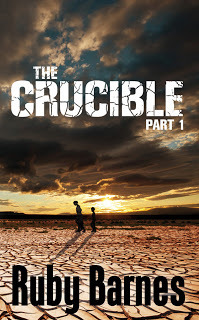 One of the great things about getting reviews for your novels is to find out exactly what it is you've written. Beauty is in the eye of the beholder and readers know best. I have learnt so much about my own writing from reader reviews on Goodreads, LibraryThing, Amazon and elsewhere.
One of the great things about getting reviews for your novels is to find out exactly what it is you've written. Beauty is in the eye of the beholder and readers know best. I have learnt so much about my own writing from reader reviews on Goodreads, LibraryThing, Amazon and elsewhere.The book pages on this blog not only serve visitors to summarise reviews of Peril, The Baptist, The New Author and The Crucible Part 1, they also provide me with a single source of reader input that I use as a guide in marketing existing work and planning new projects.
The Crucible Part 1 has had its first two reviews from Ignite (an Amazon top 1000 reviewer) and Tammy (The Self-Taught Cook). I was a bit nervous as I've deviated from my first person, present tense narrative style and stepped out of the crime / psychological thriller genre into political thriller (in fact I'm still genre bending as you can tell from Tammy's review). The body count is high (Rapture proportions) and the novel deals with themes that readers may well hold strong opinions about - religious fundamentalism, AIDS and far right & left politics. These first reviews are encouraging and so I've decided to go straight to paperback with a launch date of 8th February (when I've recovered from my 50th birthday party!) It's a great opportunity to do a Goodreads Giveaway and there are two paperback copies up for grabs below.
.goodreadsGiveawayWidget { color: #555; font-family: georgia, serif; font-weight: normal; text-align: left; font-size: 14px; font-style: normal; background: white; } .goodreadsGiveawayWidget img { padding: 0 !important; margin: 0 !important; } .goodreadsGiveawayWidget a { padding: 0 !important; margin: 0; color: #660; text-decoration: none; } .goodreadsGiveawayWidget a:visted { color: #660; text-decoration: none; } .goodreadsGiveawayWidget a:hover { color: #660; text-decoration: underline !important; } .goodreadsGiveawayWidget p { margin: 0 0 .5em !important; padding: 0; } .goodreadsGiveawayWidgetEnterLink { display: block; width: 150px; margin: 10px auto 0 !important; padding: 0px 5px !important; text-align: center; line-height: 1.8em; color: #222; font-size: 14px; font-weight: bold; border: 1px solid #6A6454; -moz-border-radius: 5px; -webkit-border-radius: 5px; font-family:arial,verdana,helvetica,sans-serif; background-image:url(http://www.goodreads.com/images/layou... background-repeat: repeat-x; background-color:#BBB596; outline: 0; white-space: nowrap; } .goodreadsGiveawayWidgetEnterLink:hover { background-image:url(http://www.goodreads.com/images/layou... color: black; text-decoration: none; cursor: pointer; }
Goodreads Book Giveaway
 The Crucible by Ruby Barnes Giveaway ends October 04, 2012.
The Crucible by Ruby Barnes Giveaway ends October 04, 2012. See the giveaway details at Goodreads. Enter to win
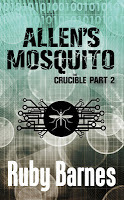 Now, Ruby is going to be a bit quiet for a couple of weeks, writing up Allen's Mosquito - The Crucible Part 2.
Now, Ruby is going to be a bit quiet for a couple of weeks, writing up Allen's Mosquito - The Crucible Part 2.
Published on August 10, 2012 06:19
August 4, 2012
Peril gets a KindleBookBlast!
 Ger Mayes loves attention and he's getting some on KindleBookBlast today Saturday 4th August.
Ger Mayes loves attention and he's getting some on KindleBookBlast today Saturday 4th August.This is a nice site for authors, promotes your book well for a day and is a neat way to get RTs for your work too. If you sign up for their newsletter you'll receive email whenever the door opens on a new promotion opportunity. Go take a look.
Published on August 04, 2012 10:30



